We are all familiar with Jigsaw puzzles. Scattered, usually on a table are hundreds, sometimes thousands of oddly shaped pieces of a picture which the players try to bring to life by continually comparing what they are doing with the object pictured on the box. Those working on the puzzle have the task of reproducing the picture by matching colors, patterns, and shapes, with the pieces before them.
We have discussions, exchange of ideas, and with time, shared effort, determination, and persistence, not only achieving the results intended but also the unintended results of collaboration, cooperation, partnership, and synodality, this last word, at this time is the word which is familiar to the Catholic community wherever it exists.
Can we use this word synodality to help us realize the full promise of Paul's statement in First Corinthians: "All of you are Christ's body, and, each one is a part of it." Synodality means journeying together as the People of God. A way of listening to each individual person as a member of the Church to understand how God might be speaking to us.
Sadly, except for synodality, these secular words are more often used in the business and legal world than in the church. However, are they not the words that describe more accurately and clearly what is meant by becoming an authentic witness of what we are as a church?
Sadness comes when we realize the Catholic Church is often disliked by many outside and not infrequently by those within. We fail in imaging Jesus and consequently, the community is not a valid sign of Jesus' Way. We are not a community, equal partners working toward the building up of Jesus' Kingdom. We use the term community but in most cases, the reality is missing. Jesus meant for us to be a community that is collaborating, cooperating, and in partnership. Working together is not primarily necessary to help one another or to be more effective but as a way of being an authentic witness of what we are as a Church.
The images of salt, light, and leaven although indiscriminately applicable to all Jesus' disciples, are specifically applied to the lay faithful (1). Although the Church has made it clear that the vocation of the layperson is as important as that of the clergy and religious this message is often blurred. They make up the vast number of disciples and have the hardest tasks presented to them with very little help. History makes it clear why this is the case, but we are living in the 3rd millennium. They not only belong to the Church but are the Church under the leadership of the Pope and Bishops (2).
The laypeople are a "sleeping giant" whose time has come for them to take their rightful place within the community. All lay Christians have been called to share Christ's priestly, prophetic, and kingly office, both in the Church and the world but it is the world where they have to excel with their charisms. They are partners in the work given to all of us by Jesus, this is their exalted vocation. By exalting the vocation of the clergy and religious, a tendency exists to minimize the vocation of the layperson. This is a serious error, weakens the laity, and does not energize or give them the desire to participate in the work of the Church.
The ministerial priesthood is in the service of the common priesthood. It is directed at the unfolding of the baptismal grace of all Christians (3). We are all partners working in the vineyard of the world. There is a difference in 'function but not in dignity and holiness'. Here tension exists, for at times there is a stress on the structure of the Church, a sign of our oneness and at other times an acknowledgment of the gifts of God to the individual and the shared roles arising from Baptism and Confirmation. These two truths should not be in opposition but often are.
More important is that in Church law and our tradition the layperson has only a consultative vote in Church deliberations. We should remember, however, that those with authority can choose to share this authority. This is the right that the pastoral worker has. The Church is calling the lay faithful to take an active, conscientious, and responsible part in the mission of the church.
By working together in a loving and uniting relationship, we are being catechized by the very highest form of catechesis. It is within such a relationship that we grow in faith and love together with others. Something happens to us because we are doing Christ's work together. Christ's reason for choosing not to work alone but sending disciples out by twos may help us to appreciate this. We all have certain talents given for the building up of the whole church but we also have acquired certain liabilities that tend to weaken it. Do we not need to know that others are there to help us when weak and are available to help others where strong? It is this dialogue this perspective that teaches more than words and keeps us from losing our composure within the Church.
1 Christifideles Laici, n 15
2 Ibid 9
3 Catholic Church Catechism#1547
